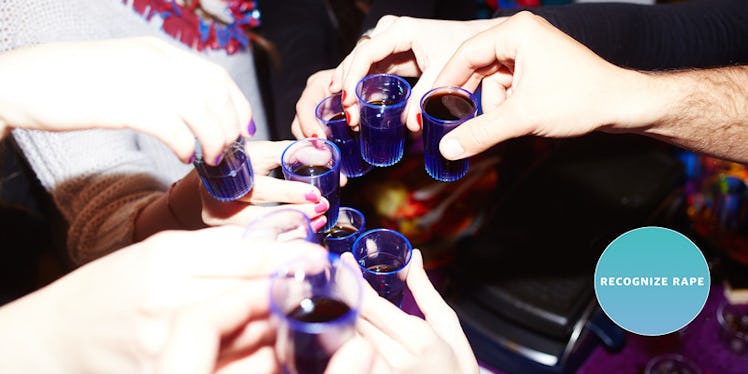
How Our Obsession With Getting Laid In College Blurs The Lines Of Sexual Assault
I was in my senior year at Columbia University when the conversation about sexual assault burst open on campus.
I spent the first three years of undergrad hearing everyone's tales of casual sexual exploits, fueled by alcohol, and figured that was the norm. Either you were happy having tons of casual sex, or you were avoiding having tons of casual sex, and that was it.
But simmering under the surface was a predatory culture of expectations.
At its lightest, that expectation led to frustration. At its worst, it led to sexual assault.
I was part of this culture. I went to parties, high-fived friends for hookups, wing-manned... all of it.
It wasn't until I found out people I knew had been accused of sexual assault that I examined my own behavior — how I had not only been a part of the culture, but encouraged it.
When you are part of a culture that tells you getting laid is always a net positive, it's difficult to see the dark underside of that. And the hook-up culture of our generation walks a fine line between fun and frightening.
Lisa Wade, a sociology professor at Occidental College, has been researching our generation's sexual habits. Her new book, "American Hookup: The New Culture of Sex on Campus," which comes out in January, is all about how the culture functions.
What makes our current hookup situation different from previous generations, Wade told me, is that "everyone expects that everyone" is having casual sex.
This is different from when she went to college in the '90s. Then, she said, there were hookups and there were people not having sex, but it wasn't considered weird if you weren't having sex. Now, it is.
If you're not hooking up, then there's something odd about your behavior. That is what's new.
The funny part, of course, is that hook-up culture hasn't been necessarily increasing the amount of sex on campus.
Millennials are having the lowest rates of sex among 20 to 24-year-olds since the 1920s, according to a recent study.
Some people are legitimately into casual sex, so they're having lots of it, Wade said. But other people aren't, so they're largely not having sex.
But today's relationships are often borne out of hookups, so many of the people who don't like casual sex aren't getting into relationships and thus are really not having sex at all.
Overall, though, we expect sex to be a thing everyone's having and everyone's trying to get.
Wade explained that this hook-up culture very much encourages rape culture.
[Hookup culture] both camouflages sexual predation and it catalyzes it.
The behavior that hook-up culture celebrates is often linked to assault. This can make it hard for people to distinguish sexual assault from normal hookups — an issue that has come up frequently in campus sexual assault cases.
We don't recognize predatory behavior as necessarily wrong. It's just what everyone's doing. Wade said,
In hook-up culture, [sexual assailants'] behavior looks perfectly normal. Getting women or other targets really drunk, touching them in public, pulling them into secluded parts of a space, having sex with really drunk people. Alcohol is the most commonly used date rape drug on college campuses. They are very strategic about identifying which of their peers is the most easily exploitable and then using hookup culture as a camouflage for that behavior.
Wade said we need to change the conversation from warning women entering college about sexual assault to warning men entering college about becoming sexual assailants.
Hook-up culture tells young men fresh on campus that they should be on a quest for sex and acting in certain ways to get it.
(Sexual assault happens across genders, but men are more frequently the assailants.)
Wade said,
Peers will think you're cool if you're a guy if you can get sexual access to certain kinds of people. Coercion, manipulation, taking advantage of situations are all things in hookup culture that men are encouraged to do. Some men who would otherwise never behave like that might find themselves prompted.
There are effective ways to prevent people from becoming assailants, including Green Dot and bystander intervention training, but they depend on colleges dedicating actual time and money.
We're not going to be able to reduce rates of sexual assault by having all students take a quiz before they enter freshman year about what sexual assault is.
When a hookup doesn't cross the line into sexual assault, it can still be bad.
So much of the behavior they're doing that isn't sexual assault is still asshole behavior.
Something our generation really needs to work on, Wade said, is treating each other like, well, humans. In casual hookup situations, we often do things that aren't necessarily illegal, but are "dick moves."
This is not all our generation's fault. American culture — from mainstream pornography to movies and TV shows — tells us that hate and lust are often intertwined.
As Wade puts it,
We have a society in which having sex and being cruel are perfectly compatible and maybe even sexy — and maybe even ideal. So should we be surprised that our students don't somehow magically know that even if they're having casual sex they should be treated nicely like a human being?
The word "fuck" demonstrates this. It means having sex, but also otherwise has actively negative connotations.
Sex is seen as something antagonistic, where cruelty and uncaring is valued.
Wade said,
You have to be nice when you're doing this. You have to care about the other person as a human being. You don't have to love them, you don't have to commit to them, you certainly don't have to be monogamous, but you're not allowed to treat them like they're not a human being.
Citations: Bwog, The Daily Beast, New York Magazine, Bureau of Justice Statistics